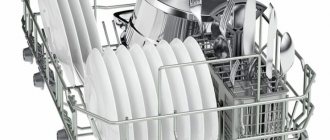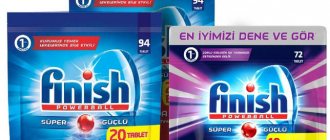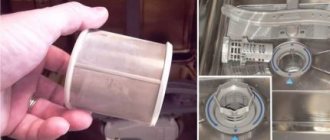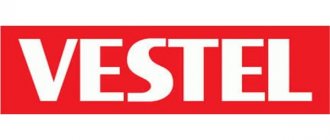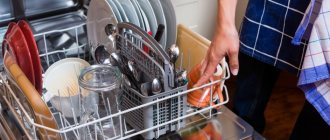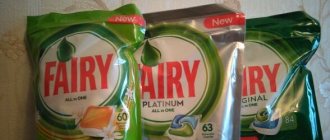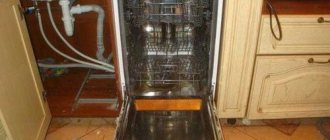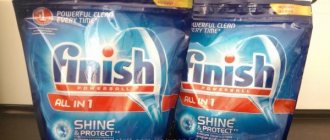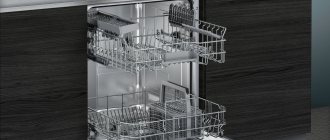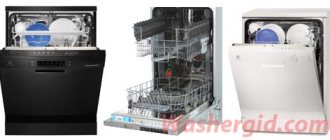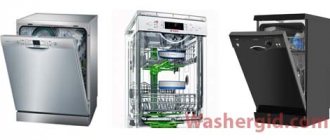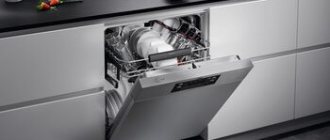Almost the entire modern world has a wide range of choices in household appliances for the home. Due to constant employment, there is not always enough time to solve all household issues. That is why household appliances are needed, so that with their help you can save precious time, and make housework easier and more efficient.
Many owners have dishwashers at their disposal, and are very happy about it. When a certain amount of used dishes has been collected, you just need to place it in a special machine and put in the appropriate products for its operation.
However, sometimes you can encounter such an unpleasant situation when the necessary remedy that you used, for example, tablets, has run out. What to do and what to do?
This article will discuss the main and alternative options for dishwashers. To know exactly what you can use to replace dishwasher tablets, and not to fear for the quality of operation of this unit, and especially for its future fate in long-term use. Or it is possible to switch to other means altogether in order to make more economical purchases and save the family budget.
Main types of chemicals for dishwashers
The most recommended detergents for use in dishwashers come in several common and commonly used categories, such as gel, tablets and powder.
dishwasher detergents
All of these detergents are well suited to any type of dishwasher and effectively cope with their tasks, washing all dishes to a perfect shine.
Let's look at each detergent in more detail:
- Gels. Gel-based detergents are absolutely safe for dishes and do not particularly affect human health, but they do not have a cheap price policy. They remove dirt efficiently without damaging the surface, since they do not contain hard particles and abrasives, so the gel dissolves perfectly when dropped into water. Well suited for washing porcelain and silverware;
- Pills. The pricing policy is more expensive than the other two detergents; they are more convenient to use than powder because they cannot crumble. They please with their high quality of cleaning dishes, one tablet is used for one cycle;
- Powders. Detergents of this type have the cheapest pricing, are convenient and effective to use. Unfortunately, they have negative sides: the powder, when placed in a special compartment of the dishwasher, can scatter by. Also, some chemical components have a hard structure and can scratch the surfaces of delicate dishes.
How much money does it cost per year?
Saving is one of the arguments for creating “folk recipes”. What amounts are we talking about? Costs depend on the type of special equipment:
- Tablet preparations - 6,000 rubles;
- Gel or powder product - 2000-3000 rubles. But when using them, you also need a rinse aid - plus 1000 rubles. Total 4000-5000 rubles.
A small family spends the same amount to pay for electricity for six months. There is a reason to think about saving.
Chemical composition
Based on the composition of their contents, cleaning chemicals are of the following types:
- Products containing chlorine are suitable for removing heavy stains and deposits from drinks and have a whitening effect; They can damage the surfaces of fragile, thin and metal utensils.
- Weakly alkaline detergents clean dishes carefully and at low temperatures, suitable for all types. They can cope with all stains on dishes;
- Detergents , which are made from natural ingredients, completely decompose when washing dishes. They do not contain any aggressive chemicals (dyes, phosphates, chlorine, synthetic preservatives, etc.). They are able to dissolve any contaminants due to active natural ingredients and oxygen.
In the process of washing dishes, you will need not only basic chemicals, but also additional ones:
- Dish rinses. The main task of such products is to eliminate deficiencies after the main washing of dishes; they contribute to the impeccable cleanliness and shine of all surfaces of any dishes;
- Water softener. Such products are added along with the main detergent; they soften hard water, which has a detrimental effect on the technical condition of the dishwasher.
Advantages and disadvantages of homemade products
Homemade dishwasher tablets are suitable for occasional (not constant) use.
Among the advantages:
- precise knowledge of the composition;
- the ability to change the proportions of substances depending on specific requirements (water parameters, duration of the washing cycle);
- low cost.
The disadvantages include:
- The need to test the composition experimentally. In store-bought products, the dosages are adjusted and calculated, which greatly simplifies the work.
- It is necessary to allocate time for selecting components and preparing tablets.
- Unpresentable appearance of homemade briquettes. Multi-colored, interspersed with gel beads, store-bought products Finish, Somat and others are more attractive, although for some this criterion is completely unimportant.
Whether or not to “sculpt” (sculpt, make) homemade tablets at home according to folk recipes is up to everyone to decide for themselves. You need to be prepared for the fact that purchasing a dishwasher also means additional costs for special detergent compositions. Homemade products will save some money, but it is not recommended to use them constantly.
What can replace special products?
There are alternative detergents, since special detergents do not have a cheap price policy.
- Degreasers;
- Rinse aids;
- Special salts.
However, it is imperative to wash it yourself at least once a month with detergents such as citric acid and vinegar .
There are some reasons why people refuse chemical detergents when using dishwashers.
This is due to the fact that such funds are expensive and run out quickly; their content includes substances that have a harmful effect on the human body; natural products are environmentally friendly and cheaper.
Do I need to look for a replacement for store-bought tablets?
You can think about replacing store-bought tablets with homemade ones for a number of reasons:
- Specialized household chemicals are quite expensive.
- Industrial products contain components that have a detrimental effect on the human body and the environment.
Manufacturers assure consumers that the concentration of hazardous substances in tablets is minimal. But the combined effects of the ingredients increase the risk of harm to health. Even repeated rinsing does not completely remove traces of chemicals from kitchen utensils.
bio mio tablets
Experts believe that due to poor rinsing of dishes, up to 0.5 liters of detergents enter the human body per year. This can cause a number of diseases.
Expert opinion
Irina. Housewife.
Ask a Question
Natural homemade pills are not only safe and environmentally friendly, but also inexpensive.
What can substitutes be made from?
As an alternative to special dishwasher detergents, you can prepare characteristic mixtures yourself at home, knowing the composition of the components. You can safely refill the PMM with such mixtures and not have to worry about the quality of dishwashing, especially when you don’t have tablets on hand.
You can achieve maximum harmlessness by adjusting the percentage of all necessary components. All the necessary components can be purchased at a hardware store or on pharmacy counters, and some are simply sitting around the house unused.
Detergent substitutes are prepared on the basis of such natural products:
lemon juice, citric acid;
lemon juice, citric acid
soap - laundry soap, an absolutely harmless substance, is added to the mixture with hot water, glycerin and alcohol in the correct proportions;
laundry soap
baking soda - perfectly removes grease and heavy dirt, mixed with borax and added when washing dishes;
baking soda
mustard powder is a cheap and environmentally friendly product;
mustard powder
vinegar - it is better to use apple cider vinegar; it does not destroy aluminum and rubber parts of dishwashers;
vinegar
glycerol
glycerol
It is not recommended to use washing powder, as it foams too much and contains substances that contribute to allergic reactions.
How to make it yourself
To create a dishwashing detergent, you need to have minimal knowledge of chemistry and strictly follow the instructions. This will help avoid various troubles such as chemical burns and skin irritation.
Ingredients
To make dish soap, you will need different ingredients, depending on the recipe. You can find them at the pharmacy; some substances are worth looking for at home (soda, for example). Missing ingredients can be purchased at the hardware store.
Capacities
If you plan to create tablets, then take care of the molds; preference is given to ice molds. But, naturally, after using them for this purpose, further use for their intended purpose (as ice containers) will be impossible.
Homemade detergent recipes to replace tablets
Of course, it’s not entirely possible to make a full-fledged substitute for dishwasher tablets, but you can prepare products that are close in composition.
There are several simple recipes that can replace dishwasher tablets.
Recipe No. 1
Necessary ingredients: lemon juice (200 g), salt (10 g), soda ash (200 g), borax (100 g).
Cooking method:
- pour all the bulk ingredients into a container and mix, pour in lemon juice and mix thoroughly (don’t be alarmed, the mixture will sizzle);
- We take small molds, and after the mixture stops sizzling, fill them (you can take ice molds);
- put it in a warm place (out of direct sunlight or a warm radiator);
- After the mixture dries, “tablets” are obtained, which can be used as a replacement for special tablets for dishwashers.
Recipe No. 2 (very cheap and effective substitute)
Required ingredients: hydrogen peroxide (1 teaspoon), hot water (1 glass) and soda ash (1 teaspoon).
Method of preparation: all components are simply mixed and added to wash dishes.
This product is well suited for spoons, forks and plates.
Not suitable for washing burnt kitchen utensils.
Recipe No. 3
Necessary components: borax (125 g), mustard (250 g); soda ash (250 g).
Method of preparation: the components are thoroughly mixed.
The product must be stored in a cool place.
Recipe No. 4
Necessary components: grated soap (170 g), soda ash (50 g), glycerin or dishwashing detergent (5-10 g).
Method of preparation: mix the ingredients, bring to a uniform paste and place in molds, then dry.
If such a substitute product does not provide the desired shine, then you need to add a rinse aid.
Recipe No. 5 (rinse aid substitute)
Necessary components: lemon juice (100 g), glass cleaner (20 g), essential oil (30 g).
Method of preparation: mix all ingredients thoroughly and can be added to the special compartment of dishwashers.
How to make powder for PMM
Let's discuss one simple recipe that will help you create powder for PMM at home:
- take citric acid;
- add soda to it;
- add baby powder to the mixture.
Maintain equal proportions; if necessary, supplement the recipe with borax. This will help you get a good product, which, however, will not be very economical - it costs a lot.
Advantages and disadvantages
The main advantages of homemade gels and tablets are low cost and safety. The user at least knows what he uses to wash plates and cups. The disadvantage is that it takes time. It is much easier to buy everything you need in a store. The appearance of homemade products is also not particularly attractive, and they do not last long. And you need to calculate the dosage yourself.
Recipe No. citric acid
There is another universal recipe for making detergent. To prepare it you need to mix the following ingredients:
- soda – 200 gr.
- borax -150 gr.
- sodium sulfate -500 gr.
- citric acid – 100 gr.
It is necessary to connect all components and move them carefully. This powder can be used to make tablets that can be used to clean kitchen appliances in the dishwasher. You can also dilute it with a small amount of water to make a liquid mixture.
It is preferable to use tablets rather than a liquid mixture. They are less aggressive and will remove plaque more carefully.
Ingredients for homemade compositions
To restore order in the house, housewives often use powders and liquids available in the kitchen. They are the components of complex compositions for the dishwasher. Each ingredient performs one or more cleaning functions:
- Powder (notional) from laundry or baby soap is a surfactant: the main component of the detergent. First, the soap bars are dried, then crushed on a grater. Small soap remnants are also suitable for preparing the powder.
- Baking soda – acts as a cleaning agent. Keeps dishes white. It won’t cope with grease, but it will remove scale and stains from tea.
- Epsom salts, magnesium or sodium sulfate. The appearance resembles coarse table salt, but has nothing to do with it.
- Citric acid - removes limescale and scale from the surfaces of the dishwasher chamber and its heating element.
- Borax, sodium boric salt – has cleaning and disinfecting properties. Sold in pharmacies and hardware stores.
- Glycerin is a viscous, colorless liquid with a sweetish taste. Antiseptic and good solvent.
- Table vinegar – kills bacteria and microorganisms, used to remove lime salts in household appliances.
- Mustard has long been used to clean grease from baking sheets and frying pans.
To give the dishes a fresh smell, you can add a few drops of essential oil to the prepared composition. Additions of citrus aromas also help dissolve fat. It is recommended to add table salt to any mixture - it is used as a hard water softener.
Have you set the water hardness in PMM?
Yes, of course. No.
Composition based on magnesium
Magnesia, or Epsom salt, successfully washes even the dirtiest dishes. Based on it, you can make a mixture by adding several other components in the following proportions:
- Magnesia/Epsom salt/Epsom salt – 2.5 cups;
- soda ash – 1 cup;
- sodium tetraborate (borax) – 1 glass;
- citric acid – 0.5 cups;
- liquid/gel for washing dishes – 4 tbsp. l.;
- water – 1 glass.
Borax and Epsom salts can be purchased at pharmacies; these components are inexpensive. Dissolve citric acid in water. Mix the remaining dry ingredients thoroughly. Add the acid solution to the dry mixture, avoiding too violent a chemical reaction. Mix all the ingredients well, distribute the resulting slurry into the molds and wait until it dries.
What should you consider when preparing homemade products?
- Size. When making dry capsules, take into account the dimensions of the tablet compartment in the PMM - a large product simply will not fit in it.
- Safety. When preparing detergents, wear a mask and gloves to prevent particles of powdered ingredients from getting into your eyes and lungs.
- Concentration. Don't overdo it with baking soda: if it doesn't dissolve, it will leave a white residue on the appliances.
Briquettes based on soda ash
Experienced housewives often use the following successful combination of several ingredients, resulting in a good composition for washing cutlery:
- soda ash - 3 cups;
- table/Epsom salt (magnesia) – 1.5 cups;
- citric acid – 0.5 cups;
- manual dishwashing liquid - 3 tablespoons;
- water – 1 glass.
Before mixing, the soda ash must be heated in a clean frying pan for 15 minutes, stirring occasionally. Only after this can you add the remaining components. Then the mixture is distributed into molds and waited until it dries.
Conclusions and useful video on the topic
In the video below you will hear a detailed analysis of different types of products intended for dishwashers:
Information on testing different types of tablets used in units for processing kitchen utensils:
It is hardly possible to give one answer to the question of what products are best to use in dishwashers. This largely depends on the composition of the preparations, kitchen appliances, and utensils.
In order for the devices to be impeccably clean and the machine to work stably for a long time, it is important to strictly follow the instructions. It is also advisable to use products from well-known companies that are responsible for the quality of their products.
Please write comments in the block below. Tell us what kind of dishwasher tablets or powder you use. Share what was the decisive criterion for you in choosing. Ask questions about unclear and controversial issues, post photos related to the topic of the article.
Tips and tricks
Regardless of what dishwashing products are used, we will give some useful tips to the happy owners of such equipment:
- Monitor the quality of the water - if it is hard, then this factor significantly reduces the life of the machine.
- When using tablets made, as they say, “with your own hands,” set the temperature to 40-50 degrees.
- Every month, run the machine “idle”, without dishes, after pouring a bag of citric acid and a few spoons of soda into the compartment.
It is not difficult to create tablets at home that will replace store-bought products. In terms of characteristics, they will differ little from those purchased. But the process of creating such products should be taken with full responsibility, not to violate the recipe and to refuse dubious experiments. Otherwise, there is a risk of damaging the equipment.
Share link:
Flaws
There are several disadvantages to using a homemade liquid consistency.
- It is more convenient to use a purchased product. It is enough to open the cap and pour the required amount of liquid into the specialized compartment. Accordingly, the user does not have to spend his personal time preparing it.
- It is not always possible to invent a high-quality product. An incorrectly created composition may leave residue or impurities may not be washed off well.
- The resulting consistency may not look aesthetically pleasing.
- When using certain ingredients, such as mustard, cutlery often leaves an unpleasant odor when it comes out of the dishwasher.
- The most important disadvantage is the possibility of equipment damage if the composition is not mixed correctly and lumps form in it.
Should you make homemade dish detergent or buy it at the store? There is not and cannot be an exact answer to this question. Each housewife will independently determine what is more convenient for her to use, based on personal preferences, amount of free time and financial situation.
Composition of factory dishwasher tablets
To replicate the properties of a PMM detergent at home, you need to know the components of the original factory sample. After this, replace the chemicals with alternative substances of natural origin.
Tablets for PMM
The composition of dishwasher tablets from all manufacturers is approximately the same.
Chlorine
The most dangerous element of the tablets is chlorine, used to disinfect water and dishes. It can lead to serious illnesses. In the European Union, the use of some chlorine-containing substances is already prohibited.
Sodium citrate
Sodium citrate, designated E331, is needed to form foam and disinfect kitchen utensils. The substance is part of food additives approved in the Russian Federation.
Sodium percarbonate
Persalt or sodium percarbonate is a derivative of hydrogen peroxide and sodium carbonate. The substance has a bleaching effect, so it can often be found in powders for white laundry. The component makes washing dishes easier by breaking down dirt.
Sodium disilicate or “liquid glass”
Another component that softens water and prevents the deposition of salts on the internal parts of PMM is sodium disilicate or so-called liquid glass. In industry, the substance is used for anti-corrosion and antiseptic treatment. In detergents, sodium disilicate acts as a multifunctional substitute for phosphates.
Sodium gluconate
A well-known food additive, sodium gluconate, has a negative effect on the human body when used in excess. The substance is found in household chemical products and is also used in the metallurgical and oil industries. The main purpose of sodium gluconate is to prevent the formation of limescale.
Soda Ash
To soften hard water, you can find soda ash in the list of ingredients in dishwasher tablets.
Sodium bicarbonate
Baking soda or calcium bicarbonate is a powder used to soften water with high salt content.
Isooctyl glucoside
Washed dishes shine clean thanks to a chemical component such as isooctyl glucoside.
Sorbitol
The thickener sorbitol is used in detergents to give the composition uniformity.
Rapeseed oil methyl ester
The resulting surface tension of water is reduced with the help of a component such as rapeseed oil methyl ester.
Glycerol
Glycerin is used to create cosmetics and smoking liquid for electronic cigarettes. In household chemicals it is used as a thickener. Glycerin makes the product viscous and helps maintain this consistency.
Acetic acid
The scale that forms on the parts of the dishwasher over time is washed off thanks to acetic acid. In addition, the substance gives the dishes shine.
Amylase and protease
These components break down carbohydrate and protein compounds, so that even dried food remains are washed off easily.
Subtilisin
An element that helps get rid of fatty contaminants is subtilisin.
Various surfactants and A-surfactants
Surfactants clean dishes well due to the fact that they connect water and fat molecules.
But at the same time they are able to break down human sebum. Therefore, these substances can cause serious harm to health. Anionic surfactants are considered the most dangerous. The effect of these harmful components can be enhanced by phosphates, since they facilitate the penetration of substances into the human blood through the skin. According to Russian sanitary standards, the concentration of surfactants in household chemicals should not exceed 5%.
Expert opinion
Irina. Housewife.
Ask a Question
These substances can have harmful effects on the human body over time. Replacing chemicals with natural products of natural origin is advisable to improve the health of all family members.
